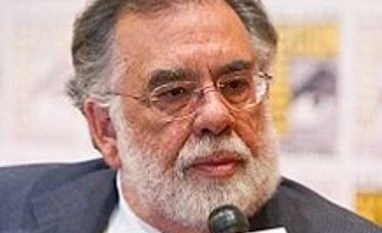Oh, gosh, am I bleeding?” Francis Ford Coppola bleated out while ambling around his Napa Valley home, talking on the phone to a reporter.
Though the director of groundbreaking films such as The Conversation, Apocalypse Now and The Godfather rarely gives interviews (even ones where actual blood is not shed), he was doing so on this Thursday morning a few weeks ago to promote The Godfather Notebook. The nifty document of film history basically takes all of Coppola’s jottings in the margins of the original novel — as well as his actual screenplay from the first installment of the trilogy — and turns them into a holiday season coffee table book. It has just been published by Regan Arts.
The book shows how he brought Mario Puzo’s 1969 novel to life in a film that would go on to win the Academy Award for best picture in 1973, excising whole portions of the story and highlighting what he believed was a flawed novel’s essence: a narrative of capitalism in America, as seen through the spilled blood and guts of one family.
But for a moment, the topic was blood — his own.
“Broke a glass,” he said, explaining that he had been watching a sports event, went to grab the remote control, and then knocked over the glass.
The cut wasn’t so bad. He felt fine, he said, save for the fact that he was bleeding, and knew there might be consequences if the blood ended up on anything valuable.
“My wife will kill me,” Coppola said.
More From This Section
“Hold on.”
So he put the phone down, went off to dress his wound and then returned for an hour’s worth of questions about the movie he would sort of like to forget, the career he’s mostly left behind and the non-film empire he’s subsequently built.
First, he made it clear that the book was a fairly low-profit venture that he did largely because people around him told him it was time. Then, he carped about his publisher.
“The amount of work that company made me do,” said Coppola, who has an unusual ability to turn complaining into a joyous experience. “I could get that from a speaking engagement. And it’s constant. I have to do this. I have to do that. I have to write the foreword.”
As well as do this interview. Oh, well. What else was there to do but make the best of it? (The interview has been edited and condensed.)
When was the last time you watched The Godfather?
Oh, I don’t know, years ago. For me, the memory of The Godfather brings great unhappiness. That movie took 60 days, and it was miserable, not to mention the months of jockeying over the cut. So my reaction is usually of panic and nausea, but that has nothing to do with how it is for the audience.
Something I liked about reading your book was finding out how methodical you were. There’s a presumption that all great art is the result of a boundless imagination. This book shows that it’s a slog.
It was insecurity. I was so young. I was hired because I was young. A lot of important directors turned it down. Elia Kazan turned it down. Costa-Gavras turned it down, a whole bunch of important directors. So the philosophy was, let’s get someone young, who could presumably be pushed around. Also, I was Italian-American, and that was good, because it meant if the studio got flak they could simply say, “But it was an Italian-American director.” And I was someone they could get for a good cheap price.
How much were you paid?
They offered me two fees: either $75,000 and 10 per cent of the profits, or $125,000 and 6 per cent of the profits. I had two kids and a third one on the way, so I took 125 and 6 per cent. I think I asked for 7 per cent and didn’t get it.
When the movie was done, did you immediately know what a hit it was?
I didn’t. Bob Evans, the producer, kept it really close to the vest. He hadn’t shown it to anyone. And I had been so browbeaten, heard I was going to be fired, that they were going to send in an action director. I was shellshocked.
What was the most widespread criticism about The Godfather?
Of the first? That it was violent and romanticised those guys.
Do you think it did?
In effect, yes. Because the acting ultimately made those people sympathetic, even though their behaviour was so terrible. Real Mafia people are animals.
Are there are movies you liked recently?
Many, actually. I loved Swiss Army Man. Totally imaginative. I liked Mommy by Xavier Dolan. Tangerine was beautiful. So full of life and humour.
©2016 The New York Times
)